People with high oxidized LDL are 4-times more likely to have heart attacks than those with low oxidized LDL.
Does this affect you? (It does.)
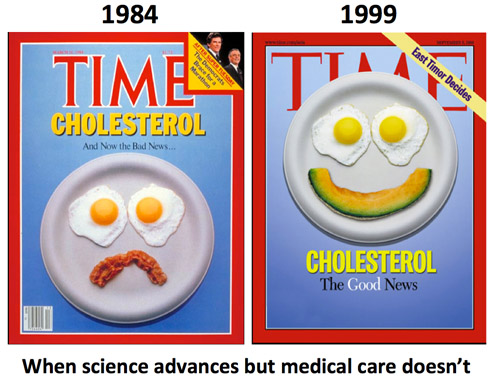
Cholesterol particles are part of the ‘gunk’ that blocks clogged arteries.
And vegetable oils contain no cholesterol. They actually lower cholesterol.
These are reasons why vegetable oil has been promoted as a ‘healthy’ alternative to cholesterol-containing animal fats.
The popularity of vegetable seed oils
Our food supply is drowning in vegetable oils. They’re cheap. They’re from vegetables. They sound healthy. What’s not to like?
You’d think that with all that vegetable goodness, clogged arteries would be a thing of the past. But it’s not.
In the last few years, I’ve beat up on Omega-6-rich vegetable oils at every chance I get. Here and here. But that’s mostly because excess Omega-6 can produce unhealthy inflammation response*. But reducing Omega-6 in your diet, you can mitigate some of that risk.
Vegetable seed oil consumption (lbs/year)
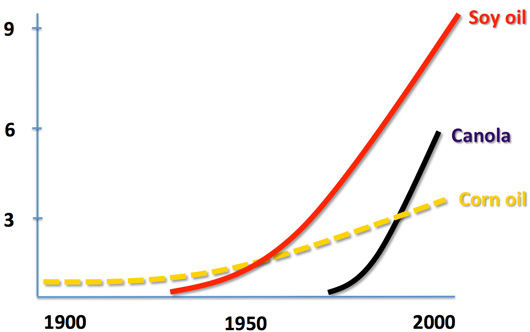
If all you’re after is a ‘healthy’ ratio between Omega-3 and 6, well, then you can out-drown vegetable oils with fish oil. Right? Technically, yes. But there is a serious flaw in this thinking.
There is a problem with excess Omega-6 that Omega-3 cannot cure. Actually, excess Omega-3 is just as much to blame. Are you listening fish-oil-glugging Crossfitters?
It has to do with your LDL cholesterol. Most of us know LDL as the ‘bad’ cholesterol, playing Joker to HDL’s Batman. But this aint the movies – it’s an over-simplified and inaccurate view of the situation because LDL is critical for healing and immune functions.
Omega-6, LDL and atherosclerosis
LDL particles get blamed because of their role in atherosclerosis. It’s not because too much LDL ‘clogs up your pipes,’ like a highway with too many cars. That too is an over-simplified and inaccurate notion. It’s a much more complicated and layered situation.
There are people with very high LDL who never get heart attacks. And those with low LDL that do. Yet, most cardiologists agree that LDL particle size and number should be watched.
Something happens to the LDL that causes it to ‘go rogue.’ And that something is oxidation.
You can leave a stick of butter or tub of coconut oil at room temperature and they won’t go rancid. The fats in these are ‘saturated’ and so they are inert – don’t go rancid.
Do the same with vegetable oil, flaxseed oil or Canola…and you have a stinky mess in a few weeks. Same with fish oil. Why? Because vegetable oils and fish oil have delicate polyunsaturated fats that can oxidize or go rancid when exposed to oxygen.
And that is a problem.
The problem with Oxidized LDL
The fats you eat end up on the outer membrane of each of your cells. So if you eat a lot of Omega-6-rich vegetable seed oils (think fried foods like french fries), your cell membranes will have more Omega-6 fats.
Similarly, the membranes of the LDL particles will also contain high levels of Omega-6 fats. After all, you are what you eat.
The Omega-6 from those super-sized french fries ends up on your LDL particle. And it goes rancid while attached to the cell membrane of your LDL. It ‘rots on the vine’ so to speak.
In effect, your LDL particles become rancid.
Damaged. Oxidized.
It’s called Oxidized LDL (oxLDL). There are other reasons why LDL oxidizes but this one’s a biggie.
When the Omega-6 fats in your LDL cell membrane oxidizes, your immune system recognizes it as a threat to your arteries and blood vessels. And the clean-up process forms a plaque to protect you from harm. When these plaques fall apart after years of build up, inflammation and oxidation, you have the recipe for a heart attack.
No amount of fish oil will save you here. Exercise will not reverse oxidized LDL either. You MUST get at this from your diet.
The tipping point…
Seed oil driven oxLDL started when we began switching to vegetable oils from fear of animal fat and cholesterol (see graph above.) And when we stopped eating butter and started eating margarine, fast food, and take-out.
I still remember my mom switching from butter to I Cant Believe Our Lifespan is so Short.
We thought we were doing the right things. But all of these things increase your Omega-6 load.
Remember that Time magazine cover with the sad bacon face? I do – I was in high school. I switched to soy sausages, corn oil, and low-fat milk on my frosted flakes. (Good Lord! What was I thinking?!)
While your great-grandmother had LDL particles too, hers had more of the stable saturated and monounsaturated fats from eating butter, lard and tallow. Your LDL, on the other hand, contain delicate polyunsaturated fats from vegetable oils.
There is a difference. Your LDL is more likely to oxidize than Great-grandma Eunice’s.
The cardinal rule of Omegas
Our bodies are built to run on small quantities of Omega-3 and Omega-6. Both are essential, but in small quantities – no more than a few grams of each per day. Without either, you die. But the cardinal rule of Omegas 3 and 6 is small quantities.
Eat a Mickey Ds french fry? Oops! Your need for counter-balancing Omega-3s just went up. You’d better eat some salmon or a fish oil supplement. OK – technically, you’re ‘balanced.’ But your just broke the cardinal rule and entered a biological rabbit hole.
If you want out of the rabbit hole, the only solution is to cut out dietary Omega-6.
We’re in the middle of a never-before-conducted human experiment of cooking everything with vegetable oils. And we need to stop and think about the effects of eating incredibly artificial amounts of Omega-6.
Why you should care about oxidized LDL
People with high oxidized LDL (or oxLDL) are four times more likely to have heart attacks than those with low oxLDL.
You may gain comfort in knowing that vegetable oils reduce cholesterol, but it also oxidizes what’s left and possibly increases death rates from cardiovascular and coronary artery diseases.
OxLDL is involved in the early stages of heart disease and artery damage.
OxLDL is a much better predictor of heart disease than LDL and HDL. Certainly better than total cholesterol. LDL is a toss up – with it, you can predict heart disease half the time.
But with oxLDL, you can predict heart disease with 82% accuracy.
Small dense LDL, the kind that goes up with low-fat/high-carb diets, are particularly vulnerable to becoming oxidized and causing blocked arteries. Another reason to cut down on sugar and refined carbs.
Your body’s defense: natural, built-in antioxidants
Your liver expects some LDL oxidation, so it packs all LDL with CoQ10 for antioxidant protection. But that statin drug you’ve been taking for cholesterol reduction…well, it wipes out your CoQ10 production.
Oops!
So…you’re gulping down Omega-6 fats…and your cholesterol meds have wiped out the only built-in protection your body can offer you.
Nice going!
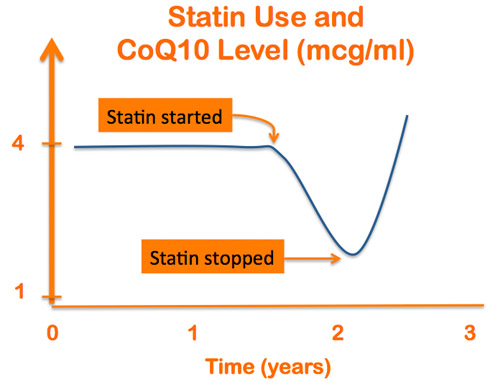
Adapted from Folkers et al., Lovastatin decreases coenzyme Q levels in humans. Proc Natl Acad Sci U S A. 1990 Nov;87(22):8931-4.
Doctors are still quick to prescribe statin drugs for lowering cholesterol, without much discussion about the risk of excess vegetable oils or oxLDL.
In some people, this added risk from statins is worth it. Is it for you? Ask your doctor. For me, no.
In the next installment, we’ll take a look at some of the factors that increase LDL oxidation and steps you can take to protect yourself. Hint: you can’t take a pill to reverse oxLDL. Sorry.
Some risks can ONLY be reduced with a dramatic change in your diet.
*These statements have not been evaluated by the Food and Drug Administration. This product is not intended to diagnose, treat, cure, or prevent any disease.
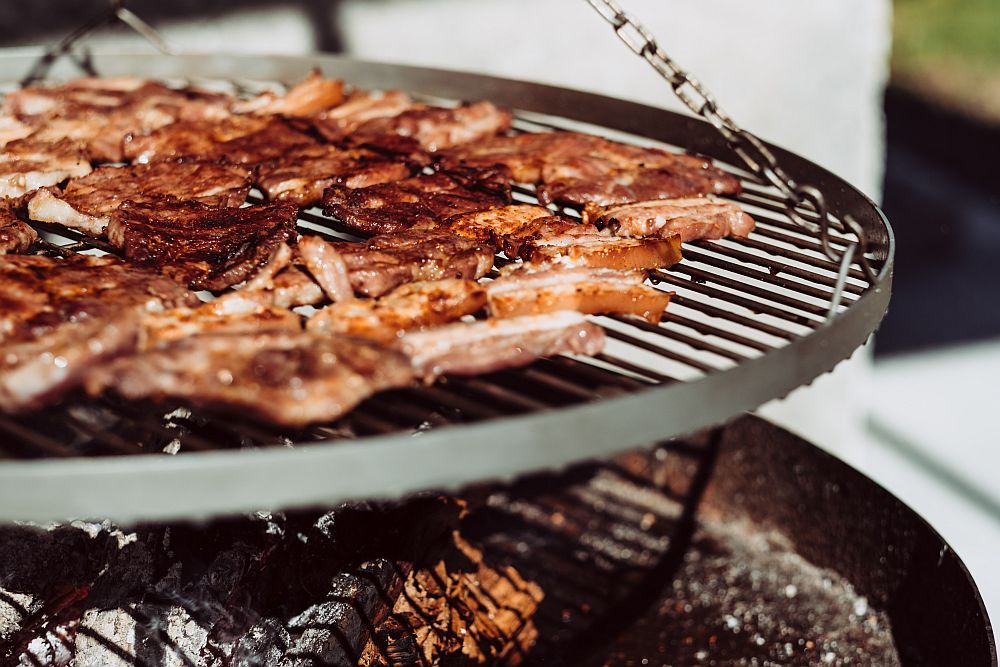
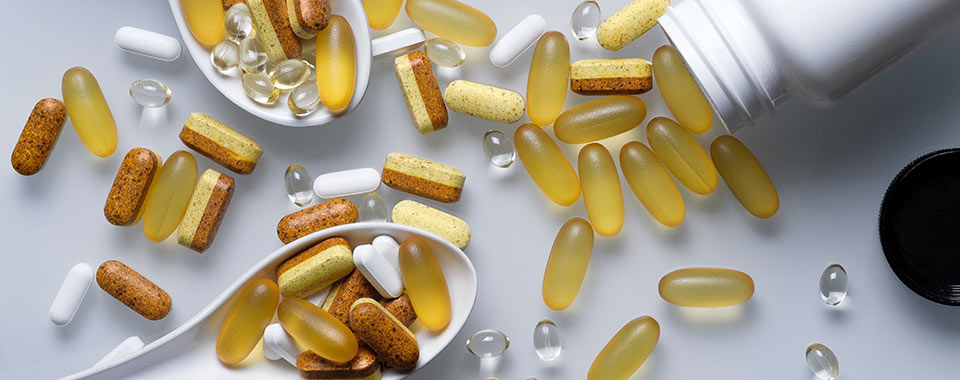

Vin,
I can bet my endocrinologist and my GP are going to be pushing me even harder to get on the statin bandwagon, since I have diabetes and RA. I have an LDL # of 120 and of course they’d like to see it at 70. Yet I had a LipoScience test done on me that indicated I had very few small dense particles (probably thanks to my Paleo diet and fish oil and avoidance of seed oils and wheat). Yet those two diseases seem to loom large in doctors’ minds when it comes to treating with statins.
I’m tempted to continue on without them. Any thoughts?
Normal cholesterol testing done this past Feb:
Total = 194
LDL = 120
HDL =60
Triglycerides -= 69
Cholesterol/HDL = 3.2
BP 105/60
HBA1C – about 6.0 at the moment.
63 years old, 136 lbs 5’9″
Hi Mark – it’s been a while. Hope you’re well.
Well, you pay doctors to give you their best advice. Usually, they are right. With the new statin guidelines, my guess is you’re right – they will be pushing you harder. My doctor is a cholesterol non-believer and a statin-skeptic…and that’s fine by me. But he is very interested in my triglycerides and HDL, neither of which are affected much by statins. You have enviable HDL and triglyceride numbers – both are more telling of heart risk than LDL and far more telling than total chol. Your A1C is just on the scary side of normal. If you were not eating a Paleo diet, it’d be a lot higher. What’s your CRP?
CRP is low, probably due to Enbrel and diet.
<.5 mg/dl with <.6 being the ref range
I am not sure that there is any evidence to suggest that fish oil derived omega 3 has any protective effect on the oxidation of LDL. I am not sure that there is literature that you would die if you don’t take omega 6 or 3 fatty acids.
Hi Sampath – There is no evidence that I know of that shows Omega-3 is protective to LDL oxidation. This is not surprising. However,there is PLENTY of evidence proving the essential nature of Omega-3 and 6. You don’t need to take supplements but you certainly need it through your foods.
Thanks
By the way, I am one of the discoverers of oxidized LDL.
Well, honored to have you here, Sampath. Would love to hear your thoughts on preventing LDL oxidation.
Is there a test to see how much oxLDL one has ?
Hi Gloria – yes, many labs now offer it. Talk to your doctor and/or call up labs in your area.
What about alge based Omega 3? That’s how fish get them anyway. But there’s no polyunsaturated fats in alge.
Hi Michael – algae based Omega-3 are fine if you are a vegan. Otherwise, it is expensive and not very concentrated.
Statins REDUCE oxidised LDL!!!
https://www.ncbi.nlm.nih.gov/pubmed/24423248
This article should be re-published. It is still both accurate and topical and too many people and doctors don’t understand this. Some of these comments here appall me. Doctors in all factual honesty do not know this information. They still prescribe statins at an alarming rate because they are paid by the pharmaceutical to do so and they still tell people to avoid all saturated fats. Most doctors are out of touch and incompetent. We have to use the internet to seek out our own information and find the truth. Don’t trust a doctor to do it for you.
Hi Jay – while I agree with you that some of the information above needs a wider audience, including doctors. A small number of educated, informed, and scientifically well-versed individuals will be able to guide themselves with self-care. However, the vast majority of people are not able to distinguish good information from nonsense that chokes the internet. This article was written before the advent of ‘fake new’ and such. I urge readers to take this information to their doctors and make a wise choice together. Many doctors will get offended if you take an article from the internet and tell them to follow a different protocol. That should not be surprising. Still, it’s the right thing to do. I am concerned about directing people away from doctors because most doctors are not incompetent. I go to 2 or 3 doctors who know all this and then some. They are ‘woke’ as kids call it these days. The trick is to find the right doctor.
So, this is My fourth blood test in a year showing high oxidized LDL. It’s supposed to be between 10–1 70, and mine is 465. Plus my omega are low. They are 3.7 and should be greater than 5.4%. My cholesterol and triglycerides are fine. I try to eat vegan, lots of nuts, and lots of vegetables. Recently I’ve limited soy and beans. I’ve been supplementing with fish oil and algae oil for a year now, to no avail. I am 58 and a little freaked out. I just had some avocado and more fish oil tabs! What else can I take to reduce my high oxidized LDL? Any help would be appreciated, thank you!
Hi Karen – the prevention of LDL oxidation is somewhat of a rabbit hole…but I will try my best to simplify it for you. You will certainly need a doctor to help you thru this.
LDL cholesterol cholesterol by itself is neither good not bad – it simply is. But LDL is prone to oxidation. That’s when the trouble starts.
Here are a couple of things that affect oxidation of LDL:
1) The amount of easily oxidized polyunsaturated fats (PUFA) in your diet. Yes, Omega-3 is a PUFA, but the amount of Omega-3 people consume makes it a non-issue. Omega-6 is the main PUFA that you need to be concerned about. Vegan diets are often very high in Omega-6 because of the reliance on nuts, seeds and seed oils. Omega-6 are essential and needed in small quantities but they pro-oxidants. I don’t know what oil you use to cook or pour over your salads, but make sure it is olive oil or avocado oil – they are low in Omega-6. Coconut may be an option too. Get your Omega3 to Omega-6 ratio tested regularly with an Omega-3 Index test. Get that Omega-6 level low.
2) The amount of antioxidants your liver packs into LDL packages as it floats around your body. The two main antioxidants that your liver packages LDL with are Vitamin E and Beta-carotene. I wouldn’t assume your diet has enough of either. Jarrow makes a good Vitamin E called TocoSorb. I don’t have a recommendation for beta-carotene, but go easy on it…take half the recommended dose. Vitamin C is the another potent antioxidant. Take 500 mg Vitamin C daily. CoQ10 and Alpha Lipoic Acids are critical too.
3) How long your LDL remains floating around in your blood. Think of it as a bunch of people hanging around the parking lot waiting to get into a building…but the door is locked. Liver has a LOT of LDL receptors. But if the receptors aren’t ‘open for business,’ then LDL remains in circulation. The longer it is in circulation, the more oxidized it gets. There are many factors that affect LDL receptor activity. Thyroid and leptin issues are among the main reasons – talk to an endocrinologist and/or Integrative Medicine MD to get to the bottom of these issues. If you have these hormone issues, even the most perfect diet will not help.
BTW, statin drugs increase the LDL receptor activity in the liver. So that will reduce the ‘hanging around’ time of LDL. I know the Internet hates statin drugs, but if you have a history of heart disease, talk to your doctor about statins.
You may be able to handle 1 and 2 above. But you will need professional help to deal with 3. I can understand if you are freaked out but…no need to. What you need to do is get disciplined and methodical in tackling this.
Avocados are great. Algae/fish oil are great. Lots of veggies/berries are great. Go easy on nuts and seed oils. If you are vegan for religious/spiritual reasons, then fine. But don’t go vegan for health reasons. A ‘mostly veggies, no sugar, and a little seafood/eggs diet’ is preferable to vegan. More veggies, berries does not mean you have to go vegan.
Hope this helps.
Thank you! I will see my dr next week for a consult. The only nuts I eat are Brazil Nuts for their selenium. 5 a day. And some walnuts in my zucchini muffins. I really eat a lot of veggies. Maybe it is my thyroid, as I am I’m borderline hypo.
I really appreciate you getting back to me! Thanks again!
Hi Karen – five brazil nuts a day may be more than you need. Most people need 1 or 2 – no more. Selenium is secondary to iodine for thyroid hormones – you need both – but take some seaweed snacks regularly for Iodine. If you do not like seaweed, try Life Extension’s Sea Iodine.
You may appreciate this: Watch “Dr. Chris Knobbe – ‘Diseases of Civilization: Are Seed Oil Excesses the Unifying Mechanism?'” on YouTube
https://youtu.be/7kGnfXXIKZM
Hi William – this is a good link for people new to the risks and benefits of Omega-6. While Omega-6 is an essential fat, we’re drowning in it…and is very harmful. It’s a topic that comes up regularly on this forum. Having said that, I encourage people to continue consuming Omega-6-rich WHOLE FOODS like nuts, seeds, eggs, and poultry in moderation. It’s the refined seed oils that I have a huge problem with. Seed oil industry (along with some scientists) may have done a disservice to humanity by branding these oils as heart-friendly.
Having said that, the presentation by Dr. Knobbe made the same mistakes that mainstream media makes – he conflates correlation with causation. Graphically plotting an uptick in modern ailments against an graph of historical Omega-6 intake is visually compelling and convincing. But that’s classic correlation. Unless he’s talking to a young or uninformed audience, he ought to stay away from blanket statements like ‘all saturated fats are good’ or ‘all Omega-6 are bad’ because it’s not so simple.
I still select Omega-9 rich olive oil as the best cooking oil. Butter from grass-fed cows is fine if you tolerate dairy. Coconut oil is fine if you don’t react to it with increased LDL. Same for lard and tallow. People are surprised to hear me say that about lard, but other than the flavor, lard is shockingly similar in fatty acid profile to olive oil.
From an oxidized LDL perspective, olive, butter, coconut, lard, and tallow are all preferable to highly oxidation-prone polyunsaturated oils like seed oils and, yes, Omega-3s.
Anyway, thanks for sharing.
Hello!
What about Genetic Cholesterol?
Is that known to be more of oxidization? My cholesterol is 4.9 and I’m told has little to do with diet! I am 60 next month and am worried as I won’t be able to take Statins!
Thank you!
Hi Gaye-Lynn – by ‘genetic cholesterol,’ I assume you mean very high cholesterol due to genetic reasons. If your blood lipid levels are strongly influenced by genetics, then this requires medical attention. Talk to your doctor if you need statins. Most people with genetic predisposition to high cholesterol require statins. But there may be other available treatments and diet/lifestyle factors that you can change to help offset the increased risk.